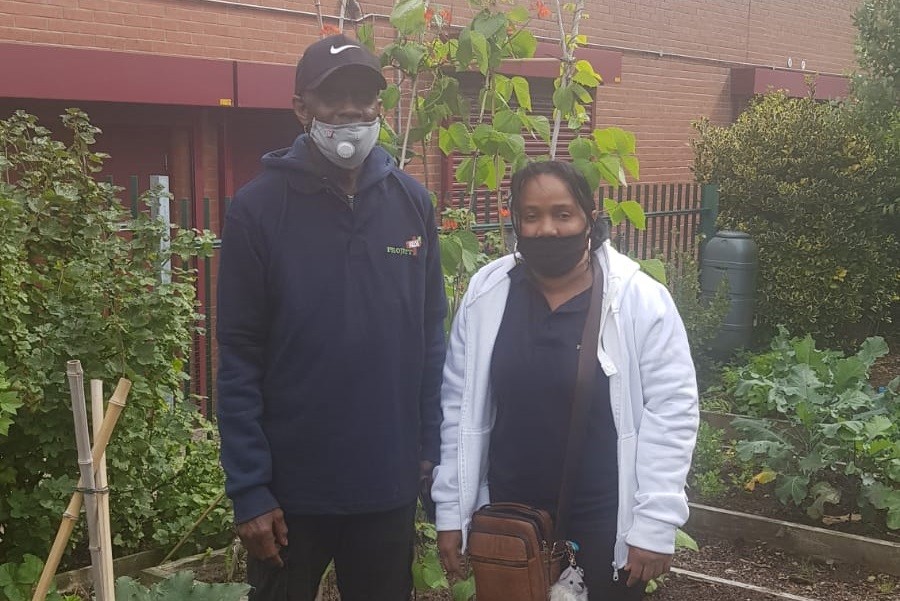Filed under : community | coronavirus | research | social integration | volunteering
Blackburn with Darwen people pulling together during pandemic, research finds
Published Wednesday 28 October 2020 at 11:53

Rickie West (right) leads a community gardening project to support vulnerable people
People in Blackburn with Darwen have developed stronger relationships with others during the Coronavirus pandemic, a national research study has found.
Researchers from the University of Kent and Belong – The Cohesion and Integration Network have been leading the ‘Beyond Us & Them’ study since May 2020.
Working with the five national integration areas, of which Blackburn with Darwen is one, plus other parts of the UK, researchers want to understand how Covid-19 is impacting feelings of togetherness and social cohesion.
The results of the latest wave of the study, The Cohesion Investment, were released last week. They show that areas that have invested in programmes to support social integration and cohesion – like in Blackburn with Darwen – are doing better in terms of relationships between people from different communities at this stage in the pandemic.
Residents in areas like Blackburn with Darwen are twice as likely to volunteer to help others during the pandemic than in other areas – 24% of people responded that they had volunteered in the past month.
Residents in areas that have invested in social integration programmes have also seen an improvement in relationships with their family and neighbours.
Through the research, respondents from Blackburn with Darwen expressed the highest levels of wellbeing and optimism about the future on average than people surveyed in other parts of the UK.
Since March in Blackburn with Darwen, many groups and individuals have rallied round to support people in need, providing food and other essentials. They have also become vital support networks, helping people with their wellbeing and mental health.
Blackburn resident Rickie West runs a community gardening project at Bank Top Neighbourhood Learning Centre in Blackburn. Grow Your Wellbeing aims to support vulnerable people living in hostels to move forward with their lives by introducing them to a positive activity in the great outdoors.
64 year old Rickie, who is originally from Montserrat in the Caribbean, said:
It is my heart’s desire to help restore people who need support for whatever reason, and give them hope.
Through the community gardening project, I wanted to involve people who are vulnerable and need support to find a positive outlet, something to focus on away from negative influences in their lives. Gardening brings so many benefits – spending time outdoors in nature and bringing life to something is so good for our mental health.
We restarted the project in September, in smaller groups to ensure we are Covid-safe.
Already we’ve seen a real difference in people’s confidence, and their outlook has changed after taking part in the project. Some participants are moving out of hostels and going for job interviews. The impact is fantastic.
It’s very satisfying that these people know they are supported, and with our help they can lift themselves up.
Arise Restoration Centre, the Christian charity Rickie founded when he came to Blackburn four years ago, has also been supporting people in need of food during the pandemic, through a partnership with Fare Share.
Rickie also recently completed the Community Ambassador programme, funded through Blackburn with Darwen’s social integration programme Our Community, Our Future.
Professor Dominic Abrams, Director of the Centre for the Study of Group Processes at the University of Kent, said:
Following the government’s investment in social cohesion in particular local authorities we now observe that their residents are more likely to volunteer, feel more optimistic and report better relationships with family and neighbours. These communities appear better set up to weather the storm of Covid-19. Our research is continuing, and so far supports a strong case for continuing to invest in social cohesion programmes at local levels.
Jo Broadwood, Chief Executive of Belong – The Cohesion and Integration Network, said:
These findings show investing in social integration and leadership at a local level can support communities to strengthen social connections and trust between groups, in order to resist divisive narratives and encouraging people to come together at a time of crisis.
Coun Mohammed Khan CBE, Leader of Blackburn with Darwen Council, said:
I am incredibly proud of the community spirit that we have in abundance here in our borough. There is a genuine culture of kindness and that stands us in good stead to address the challenges of the next few months head on.
People’s perceptions of others and their willingness to support people in need are vital to our borough’s resilience and will help Blackburn with Darwen to recover more quickly from the devastating impact of the Coronavirus pandemic. We have many residents who go out of their way to help other people, and I am so very grateful to each and every one of them.
Thank you also to the local people who took part in this wave of the research, through online surveys, telephone interviews and online focus groups.
Take a look at the Social Cohesion Investment report from the University of Kent and Belong – The Cohesion and Integration Network on the Belong website: https://bit.ly/31rRcti
To learn more about Arise Restoration Centre’s Covid-19 crisis intervention and social integration activities, visit www.projectarise.org.uk.
